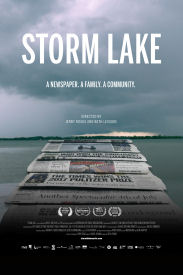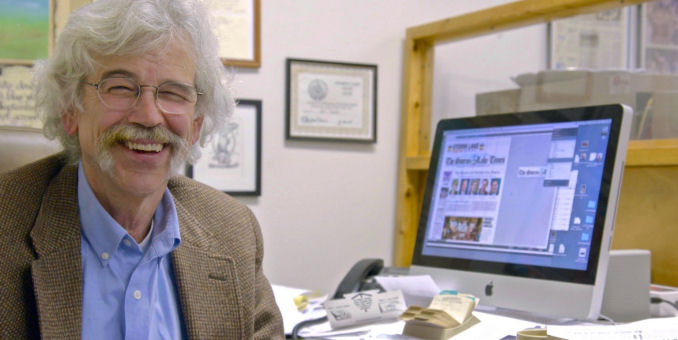 (Storm Lake screens at the 2021 Philadelphia Film Festival today, October 20th, and Sunday, October 31 in addition to being available through the festival’s virtual cinema. It will debut on PBS’s Independent Lens documentary series on November 15.)
(Storm Lake screens at the 2021 Philadelphia Film Festival today, October 20th, and Sunday, October 31 in addition to being available through the festival’s virtual cinema. It will debut on PBS’s Independent Lens documentary series on November 15.)
My first paid gig as a writer was freelancing for the Reading (PA) Eagle, covering things like local townships commissioner meetings and the like. The very first meeting I ever had to attend and report on ran for three hours, the bulk of which was the township commissioners debating how to word the new leaf collection policy in their annual brochure to residents. At first, it struck me as ridiculous and maybe even a bit petty that they took so long on such a small matter. But a sympathetic evening editor explained that even as something as seemingly inconsequential as the township’s leaf collection policy still affected people and that is why it was important to report on.
And that is the message at the heart of the documentary Storm Lake, which looks at the small town newspaper The Storm Lake Times in rural Iowa. Founded in 1990 by brothers Art and John Cullen, the Times is very much a small, family run business. Art is editor-in-chief, his wife Delores is the paper’s photographer and features writer, son Tom is the lead reporter and Art’s sister-in-law Mary writes the food column.
Director Beth Levison and Jerry Risius have crafted a love letter to small town newspapers and the vital service they provide. Twice a week, Art and his small team publish a paper that cover everything from local high school academic news and sports to much larger issues concerning things like pollution runoff from outside the county or things happening at the local Tyson chicken processing plant. And no matter what the story, the staff take their jobs as seriously as any big city broadsheet. In 2017 Art won the Pulitzer Prize for Editorial Writing for his writing about how ever encroaching big businesses threaten to eliminate small towns and the small businesses that make them up. Art’s editorials might slant towards more liberal ideals, he and his staff strive to keep the news content as politically neutral as possible.
But while the paper always seems to be wavering back and forth across the “break even” line financially, it keeps going, committed to its mission to keep the town informed and to help build their community. It is an extremely important to see this in action in an era where hedge funds have been buying up locally owned newspapers, stripping them for what they can and then dumping on another buyer hoping to do the same. As margins shrink while corporate owners demand higher profits, so many newspapers have been forced to slash their payrolls, severely hampering their ability to service their readership in the way that have been able to in the past.
The news content in the paper isn’t always confined to strictly local happenings. The Times staff also works hard to show where issues on national and global importance can still have impact and be reported on on a local level. Climate change can be hard to wrap one’s head around in the large macro sense, but The Times would bring it down to the local level by noting how the town’s eponymous lake’s spring thaw has been coming earlier and earlier. Of course, being in Iowa, the town is a stop on the Presidential election primary trail and we see the likes of Senator Amy Klobuchar, Pete Buttigieg and others coming to town, often meeting with Cullen and the Times staff as they make their way across the state hoping to drum up support for the upcoming Iowa caucus.
And while Storm Lake highlights the importance of locally produced news, it also stresses Art Cullen’s belief that papers such as the Times help to build a sense of community while also serving in their watchdog role serve as a cornerstone of the country’s democracy. After the past election cycle’s issues at the Iowa caucus, he worried that the potential elimination of the caucus process would work to keep the residents of the town from actually talking with each other instead of just staying within their own echo-chamber information bubbles. But as long as the Times continues to publish in Storm Lake, that doesn’t seem likely.





